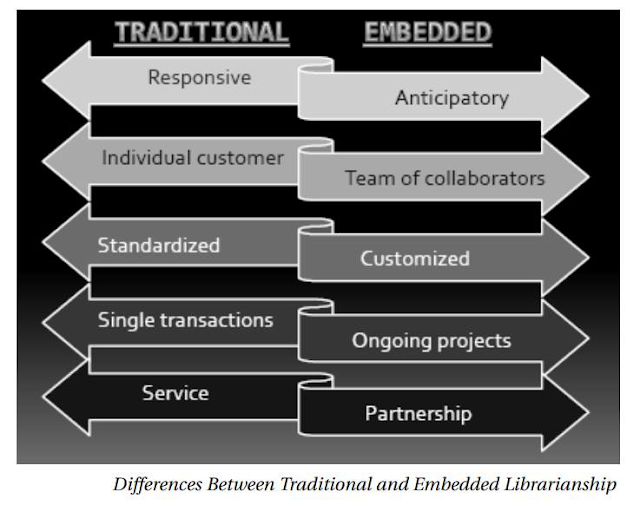Embedded Librarianship: a new era of librarianship
In this era of Internet, everyone thinks that every information is available on internet and librarians and libraries are of no use. Librarians role have changed now from gatekeeper of information , allowing access to library's resources to the guide who involves in, and helps in the learning process by providing you the various resources of information pertaining to your subjects either available in libraries or online, how to extract information from them. This changed role of librarian has given the term "Embedded Librarianship" i.e. the librarian's role embedded in the teaching and learning process, researches and can't be ignored. It requires more involvement of librarians in the teaching process, any research project or any business project than that of reference services provided by the traditional librarianship like Current Awareness Service (CAS) and Selective Dissemination of Information (SDI) which were limited to the collection of required material and providing it in desired format.
Embedded Librarian work as academic advisors give advice on academic courses and programs or work as consultant - on call expert who can apply their expertise on demand to meet the information need of any person.
Jezmynne Dene (2011) defined the embedded librarian as "an integral part to the whole,’ based on the geological definition of an embedded element" i.e. the embedded librarian is the integral part of any student group studying particular subject, any research project, any business project, who more consistently and on personal basis helps their users in their study/ research project, their work is not limited within the libraries, they work in labs, classrooms, offices, giving services online from their homes.
To change today's and future professionals in this field, it is necessary that library professionals should develop the skills required to be an embedded librarian like:
· Effective online information and databases searching.
· Ability to identify, locate and retrieve information from information sources.
· Knowledge of creating and managing digital repositories.
· Knowledge of research data management and research ethics.
· Awareness of intellectual property rights issues.
· Knowledge of self archiving, academic publishing strategies.
· Well interpersonal communication skills.
· Strong internet and networking knowledge.
· Skills of project management, event management and content management.
· Knowledge of open access journals and sources of information.
Reference:
To know more:
















.jpg)
.png)






No comments:
Post a Comment
Comments